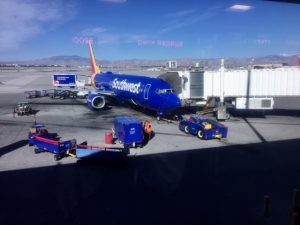Traveling Abroad? Prepare For Possible Search & Seizure Of Your Apple Devices Upon Returning Stateside
FEATURE: 05.27.19- Memorial Day marks the unofficial start of the Summer vacation season and if you’re planning to travel internationally for either business or pleasure with your Apple smartphone, tablet, or notebook computer in tow, you might want to be prepared for possible search and seizure of your devices at the airport by agents from the U.S. Customs and Border Protection (CBP) upon returning back home based on the experience of an employee working for the Cupertino, California-based tech giant who recently dealt with this ordeal after taking a business related trip abroad.

In April, Soo Youn of ABC News reported that in November of last year, when Apple employee Andreas Gal arrived at San Francisco International Airport (SFO), he was detained for one hour by three armed CBP agents who demanded access to his iPhone and MacBook Pro.
Gal told ABC News that the CBP agents insisted on searching the contents of his Apple-issued smartphone and laptop which contained proprietary information. In addition to asking about his work at Apple, the agents also interrogated him about his work at his former employer Mozilla — creators of the Firefox web browser — and his business trip to Sweden.
“They wanted to see my itinerary on my smartphone. I offered to email them my itinerary and they insisted on seeing it on my smartphone, This was very alarming for me,” said Gal.
“There’s no such thing as a cursory inspection of the contents of your cell phone. This is essentially my entire life for the last 10 to 15 years I’m carrying with me on my cell phone. And CBP seems to believe without a court-issued warrant they can inspect the last 10 to 15 years of my life just because I’m traveling internationally.”
Last month, Gal personally detailed his experience in an article where he wrote about other aspects of his detainment by CBP agents: from them taking his passport and searching all of his belongings, to refusing his request to speak to an attorney and confiscating his global entry card — a fast track that allows one to bypass security lines — consequently revoking his status as a punishment for not complying with their demands.
“I’ve worked for Silicon Valley companies for more than a decade and international travel is a necessary part of my job. I’ve had my fair share of delays and missed connections but one thing I’ve never experienced while traveling in airports is fear. …” wrote Gal.
“… I’ve reduced my international travel and my heart pounds every time I go through U.S. Customs. I will, however, not be silent.”
Gal also wrote that he has learned since that his experience was not unique. According to him — based on linked sources he cited — recently the CBP has started to aggressively question, unlawfully detain, and in some cases physically assault U.S. citizens crossing the border. Furthermore, the searches at the border are not random.
In addition to his article, Gal went to Twitter and posted a tweet about being subject to an unlawful border search and together with the American Civil Liberties Union (ACLU), he was filing a civil rights complaint against the CBP.
According to Youn of ABC News, the complaint was filed on March 28, 2019 by the ACLU Foundation of Northern California against the United States which alleges that the search of Gal’s possessions violated the fourth amendment which protects unreasonable searches and seizures.
A CBP spokesperson who responded to ABC News via email in regard to the matter wrote, in part, that in general, all travelers arriving to the U.S. are subject to CBP inspection which may include devices such as:
- computers
- hard disk drives
- tapes
- mobile phones and other communication devices
- cameras
- music and other media players
- any other electronic or digital devices.
Also, the CBP spokesperson wrote that any travelers who do not provide the items requested by their agents may result in the detention and/or seizure of the electronic device(s).
According to data from the CBP, between 2016 and 2017, the agency had a 59% jump in the number of searches of electronic devices. Approximately 0.007% (29,200+ out of more than 397 million people) of international travelers arriving to the U.S. processed by CBP agents had their electronic devices searched. In 2016, the figure was 0.005% (18,400+ out of more than 390 million people).
“Why me? I’m a boring, middle-aged, white male software executive. I’m very average,” said Gal.
“It’s not something I would have expected to experience, to get yelled at by three armed men just because I returned home.”
In his article about the ordeal he experienced, Gal wrote:
“If the government intended to scare me, they certainly succeeded. Ever since, I travel in fear.”
(Youn reported that Apple declined to comment on the matter).
